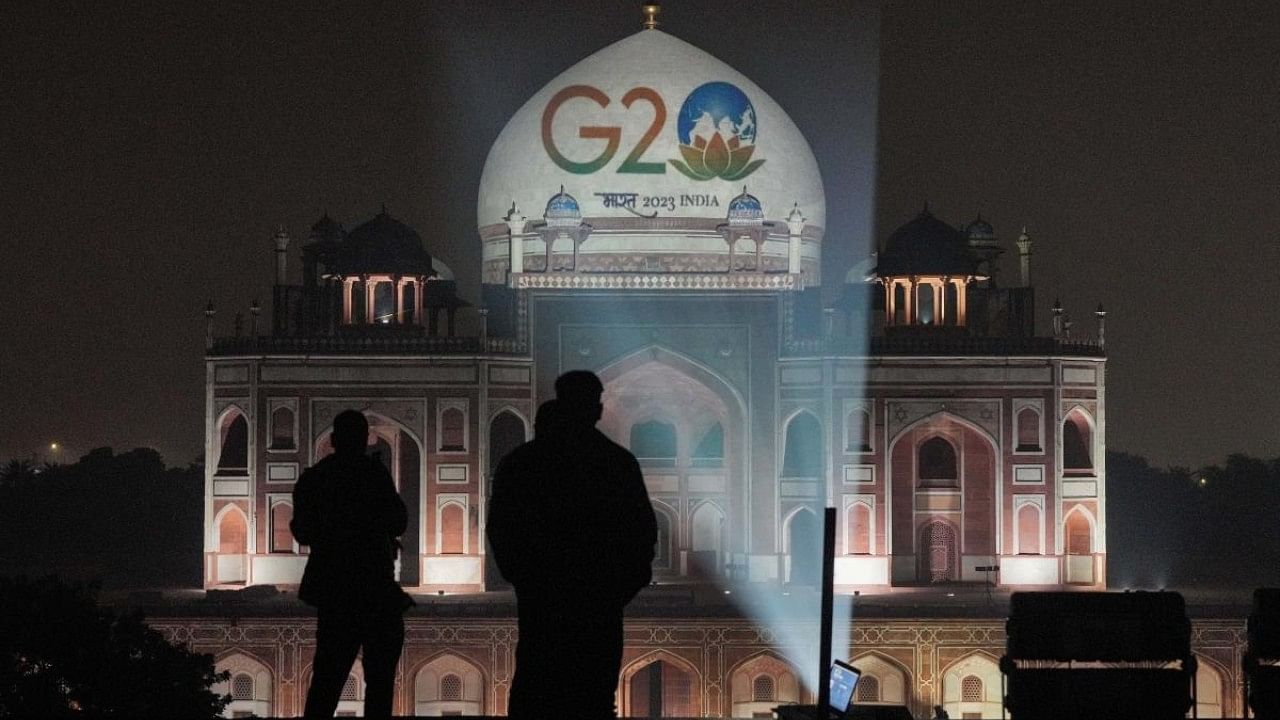
Humayun's Tomb is illuminated displaying the logo of G20 Summit 2023.
Credit: PTI Photo
G20 has dominated headlines since India assumed the presidency in December 2022. The biggest annual event of the group that comprises 19 countries and the European Union is scheduled to be held in New Delhi on 9th and 10th September. India’s national capital has undergone a significant makeover in preparation for this event. Wherever you go in the main part of the city, be it hotels, government buildings or billboards, all are covered with ads related to G20. Two things come out prominently in these ads: the G20 logo depicting lotus flower, which is also the ruling BJP’s party symbol, and Prime Minister Narendra Modi’s image.
Modi has termed India’s G20 presidency as the “People’s presidency”. From the official logo to choice of thematic colour for hoardings and other publicity materials, the underlying message seems to be more focused on domestic politics and the discourse is centered on cementing his leadership.
This brings us to a question: how has G20 evolved over the years and is India doing something different? The political messaging started with India getting the presidency of the group under the leadership of PM Modi.
The G20 summit is held annually with a rotating presidency. India is the 17th country to hold the G20 presidency. The United States held it twice. The only member countries that have not held the presidency yet are Brazil and South Africa, but the tenure of their presidency has already been decided. Brazil will hold the presidency in 2024 and South Africa in 2025. India will officially hand over
the presidency to Brazil on 1st December 2023.
Economic cooperation
The Group of Twenty was set up in 1999 after the Asian financial crisis as a forum for Finance Ministers and Central Bank Governors to discuss global economic and financial issues. In the wake of the global economic and financial crisis of 2007, the G20 was upgraded to the level of Heads of States. The first head of state level meeting was held in Washington in 2008. In 2009, the group was designated as the “premier forum for international economic cooperation”.
In 2009, the first summit level meeting was held in April in London and the leaders met again on 24th and 25 September the same year in Pittsburgh, US. In 2010, the first meeting was held in Toronto, Canada on June 26 and 27 and the second meeting of the year was held on 11 and 12 November in Seoul, South Korea. Since 2011, the meeting is held annually and the presidency has been on a rotational basis.
The focus of the G20 Leaders’ Summit has largely been on economic cooperation. In the first summit, which was held on 14th and 15th November 2008 in Washington, the “leaders discussed efforts to strengthen economic growth, deal with the extant financial crisis, and to lay the foundation for reform to help to ensure that a similar crisis does not happen again.” One of the key achievements of G20 so far is effective management of global economic and financial recovery following the 2008 financial crisis. Over time, the ambit of G20 has expanded to include climate change, sustainable development, energy, trade, health and agriculture.
Russia-Ukraine conflict became the key focus point of discussion at the 17th Summit held in November 2022 in Bali, Indonesia. The same war will dominate the discourse in New Delhi as well. The issues like inflation, disruption in global supply chain, food and energy security are closely linked to geo-political conflict. One key area one which leaders may agree on coordinated action is cryptocurrency. Given the possible absence of two influential leaders, Russian President Vladimir Putin and Chinese President Xi Jinping, any substantial outcome is unlikely from the New Delhi summit. However, it will be interesting to see how it impacts India’s domestic politics, and Prime Minister Modi’s leadership in particular.